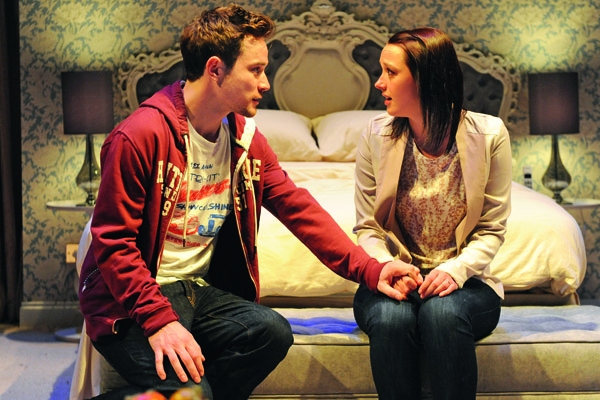Both these plays are about concealed sexuality. Straight, by D.C. Moore, is based on an American indie flick named Humpday. The play has one of the funniest openings you’ll ever see. We’re in a flat occupied by suburban nonentity Lewis and his wife Morgan. Lewis’s old college mucker, Waldorf, has come home after seven years in Mongolia and he cheekily decides to announce his return to western civilisation by inserting his unsheathed tumescence through the letterbox. Lewis doesn’t see it. His wife does and she has to persuade him that she isn’t hallucinating. The gate-crashing phallus symbolises the play’s theme of male eroticism thrusting itself uninvited into soporific domesticity.
Waldorf’s travels have loosened his inhibitions but intensified his competitive urges. After a night of booze and sexual dares, the two men agree to hire a hotel room and make a gay porn film starring themselves. Lewis then has to explain to his wife that homoerotic movie-making is a relatively normal activity for two Varsity chums. All this is done with great levity and brio under the assured direction of Richard Wilson.
In the second act, the two terrified idiots try to talk themselves into, and out of, the act of congress neither of them is committed to. The script has fewer surprises to deliver here, but it maintains its deft comic touch. The second half will certainly delight those sexual analysists who support the Boy George theory that all straight men are secretly gay and that every heterosexual act is a laughably crude displacement activity that divides the doer from his true self. Philip McGinley, as Waldorf, delivers a sensational starring performance. In his last notable stage role he played a Glaswegian rent boy selling kinky phone sex to millionaire oddballs of the Jimmy Savile persuasion. Here he does a complete Darwinian species leap and presents himself as a drugged-up, laid-back, spaced-out global citizen from Manchester. Brilliant stuff.
Hero, by E.V. Crowe, is the latest effort from the Royal Court’s stable of wonder women whose creative prowess continues to amaze and delight us all. (Mind you, some of these starry young scribes have already entered semi-retirement and are adapting Chekhov for the fringe. That’s not writing. That’s copying out.) E.V. Crowe struggles to outshine her contemporaries with this weird and ill-focused show. Her theme is being gay, or being a bit gay, but not being gay enough for gay people to say you’re gay although sometimes they might say you might be gay, when you’re not there, but they might not. I think that’s right.
Joe, the central nuisance in this fuss-about-nothing, is a needy in-the-closet dimwit who works as a teacher. When a seven-year-old schoolboy calls him gay he suffers a fit of hysterical paranoia which — by an unlikely accident — coincides with his public hounding at the hands of a gay-bashing street mob. He makes this a million times worse by leading the homophobic thugs to the flat of a gay couple whom he knows vaguely and who are trying to adopt a child. This is the kind of clunky surprise that only takes place in ill-made dramas.
The rest of the play involves wheezy conversations between characters obsessed with their sexuality, or with having children by IVF or adoption. If you slot into one of those pigeonholes you may be gripped by this but I found the characters smug and worthy, and the relationships are tedious or incredible. The script’s most noteworthy passage offers a horrific insight into modern teaching practice.
Critics of state schools like to joke that teachers praise the Spanish Armada as a fine example of an international conflict being resolved by windpower and renewable energy. In Joe’s school, things are much barmier. The details of Spain’s attempted conquest are handled with this searching piece of analysis. ‘Sir Francis Drake…sort of got lucky with all his little boats and managed to burn out most of the Spanish fleet.’ That’s the end of the history lesson. Next the children are asked to play ‘drowning sailors’ who are quizzed about their sexuality before rescuers will hoist them to safety. This exercise is considered such a hit that it’s extended to the entire school. It gets worse. A system of verbal interrogations is introduced. Teachers, administration staff and even cleaners are required to utter words like ‘lesbian’ and ‘queer’ in an approved fashion. When Joe is suspended, he is asked to say, ‘I’m gay,’ and when he jokily adds, ‘I’m not gay,’ he is deemed to have failed. This nutty Maoist brainwashing is accepted by the participants as quite natural. Is this standard practice in primary schools? God, I hope not. I have a terrible feeling it might be.







Comments